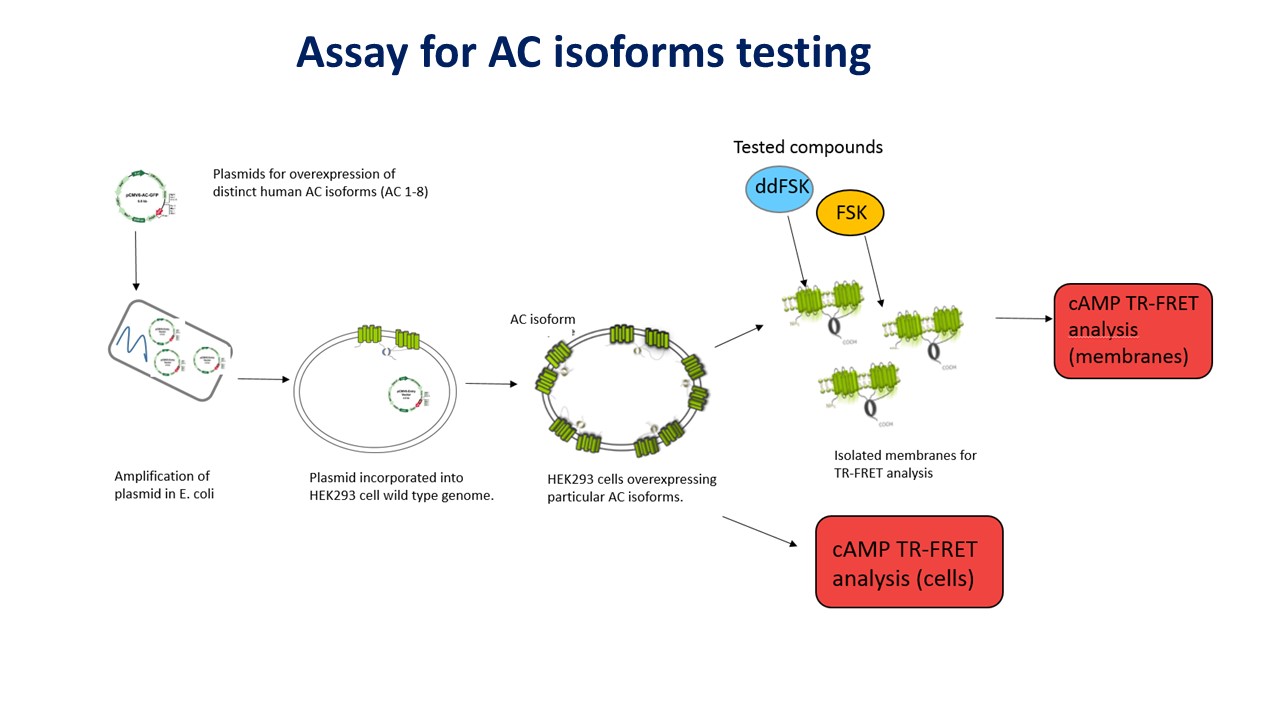Complex technology for testing selectivity of new potential drugs against individual isoforms of human adenyl cyclases
INTRODUCTION:
A testing kit which enables determination of effect of various compounds, for example pharmaceuticals, on the activity of adenylyl cyclase isoforms. The activity of adenylyl cyclase isoforms affects cell processes, and through cyclic adenosine monophosphate (cAMP) systems, it affects many signaling functions in human cells and thus affects, for example, glucose metabolism, learning, memory and cell growth. Thus, by increasing the activity of the adenylyl cyclase isoforms, it is possible to stimulate, for example, cell growth, glucose metabolism, and processes in the brain such as memory or learning. The technology is useful to companies/institutions developing novel pharmaceuticals for a range of diseases/disorders of the brain, potentially oncological diseases or metabolic disorders.
TECHNOLOGY (INVENTION) DESCRIPTION:
The kit for determining the specific effect on the activity of human membrane-bound forskolin-sensitive adenylate cyclase (AC1-8) isoforms (FSK) or other chemical compounds. Membrane fractions isolated from unique HEK293 cell clones are utilized. Analysis of affecting the activity of the individual membrane bound AC isoforms is detected by measuring cAMP production by the homogeneous fluorescence time resolution (TR FRET) method. The kit contains at least one HEK293 cell clone that selectively expresses at least one AC1-8 isoform. The kit further separately comprises a lysis buffer containing hydroxyethyl piperazineethanesulfonic acid (HEPES), ethylenediaminintertraacetic acid (EDTA), MgCl 2 .6H 2 O, dithiotreitol (DTT), sucrose, and a mixture of protease inhibitors.
ADVANTAGES OVER EXISTING SOLUTIONS:
This is a brand new unique technology that will allow testing of substances that have not been commercially available. According to available information, this methodology is not available in the proposed scope and quality anywhere else, which can be considered as a competitive advantage for this type of testing over all existing methods of testing.
DEVELOPMENT STATUS (STAGE):
The technologies has been significantly elaborated, optimized, tested in-vitro and characterized.
PUBLICATIONS:
Elucidating cyclic AMP signaling in subcellular domains with optogenetic tools and fluorescent biosensors. Klausen C, Kaiser F, Stüven B, Hansen JN, Wachten D. Biochem Soc Trans. 2019 Dec 20 Regulation of adenylyl cyclase 5 in striatal neurons confers the ability to detect coincident neuromodulatory signals. Bruce NJ, Narzi D, Trpevski D, van Keulen SC, Nair AG, Röthlisberger U, Wade RC, Carloni P, Hellgren Kotaleski J. PLoS Comput Biol. 2019 Oct 30
IP PROTECTION STATUS:
2 utility models registered by the Office for Industrial Property of the Czech Republic: PUV 33151 and PUV 33391
TECHNOLOGY / IP OWNERS :
St. Anne´s University Hospital in Brno

More information
More information is available upon signing a CDA / NDA (Confidential Disclosure Agreement / Non-Disclosure Agreement)